-
IP addresses are NOT logged in this forum so there's no point asking. Please note that this forum is full of homophobes, racists, lunatics, schizophrenics & absolute nut jobs with a smattering of geniuses, Chinese chauvinists, Moderate Muslims and last but not least a couple of "know-it-alls" constantly sprouting their dubious wisdom. If you believe that content generated by unsavory characters might cause you offense PLEASE LEAVE NOW! Sammyboy Admin and Staff are not responsible for your hurt feelings should you choose to read any of the content here. The OTHER forum is HERE so please stop asking.
You are using an out of date browser. It may not display this or other websites correctly.
You should upgrade or use an alternative browser.
You should upgrade or use an alternative browser.
Guangdong sees 1,552 new dengue cases
Xinhua, October 13, 2014
South China's Guangdong province reported 1,552 new cases of dengue on Saturday, local health authorities said Sunday.
The total number of cases has now passed 30,000, according to the provincial health and family planning commission.
Guangzhou, the provincial capital, has reported a total of 25,732 cases and the disease has been detected in 20 out of 21 prefecture-level cities in Guangdong.
Six people have died in Guangdong -- five in Guangzhou and one in the adjacent Foshan City.
More than 90 percent of dengue patients have recovered after treatment, said Yang Zhicong, deputy head of the commission, adding that the outbreak is expected to abate after Oct 20 as the weather cools.
Dengue is a mosquito-borne, potentially fatal disease that affects between 50 million and 100 million people in tropical and subtropical regions every year, causing fever combined with muscle and joint aches.
Some 23 provinces or regions of China including Zhejiang, Fujian, Yunnan and Guangxi have also detected hundreds of dengue infection cases this year.
Guangxi reports 453 dengue cases
Xinhua, October 13, 2014
South China's Guangxi Zhuang Autonomous Region reported 453 cases of dengue as of Sunday, local health authorities said on Monday.
No deaths have been reported in the region so far, according to the provincial health and family planning commission.
The cities of Nanning and Wuzhou have reported local cases, while other cities reported infections contracted elsewhere.
The total number of cases in China has now exceeded 30,000, according to an earlier report.
Six people have died in Guangdong, the province which has reported the most cases.
Dengue is a mosquito-borne, potentially fatal disease that affects between 50 million and 100 million people in tropical and subtropical regions every year, causing fever combined with muscle and joint aches.
Some 23 provinces or regions of China, including Zhejiang, Fujian, and Yunnan, have also reported dengue infections this year.
Women hit as thyroid cancers rise
Xinhua, October 13, 2014
China has reported 4.6 times more cases of thyroid cancer over the past decade, with women worst hit.
Young and middle-aged women are most vulnerable to papillary thyroid carcinoma, the most common thyroid cancer. Three out of every four patients are female, according to a national academic conference on thyroid cancer in Tianjin.
The increase of cases is closely related to better examination methods, said Gao Ming, vice president of Tianjin Tumor Hospital.
Ultrasonic technology can help find minor thyroid tumors that used to go undetected, but 95 percent of patients can recover with early treatment.
But experts said there was not enough evidence to prove a direct link between thyroid cancer and iodized salt, which has been used nationwide since 1993 in an attempt to prevent iodine deficiency in China.
China reports 3.5 million new cases of cancer each year.
Degrading teacher ethics ring alarm in China
Xinhua, October 13, 2014
A spate of scandals regarding teachers in China has not only underscored degrading ethics in the profession, but also shamed the country's education authorities for lax inspection.
On Sunday, southwest China's Sichuan Fine Arts Institute barred Wang Xiaojian, a retired associate professor, from attending any of the institute's teaching, research and academic activities, after pictures of him forcibly kissing and sexually harassing two female students in a restaurant circulated on the Internet.
Coincidentally, Wang's fall from grace came just one day after the Ministry of Education issued a guideline on ethics for university professors, a provision aimed at enhancing ethical conduct among education staff.
The guideline, which bans college staff from sexually harassing or engaging in improper relationships with students, aims at curtailing China's scandal-ridden education sector amid growing public disquiet.
It also puts forward seven prohibitions for college teachers, promising sanctions for violators. The provisions include conduct undermining national or student interests, research fraud and plagiarism.
A haze of corruption has shrouded China in recent years, and the toxic trend has spread to ivory towers, engulfing teachers, who are traditionally regarded role models of high moral standard.
Teaching staff with rotten character will wield a very bad influence on students. Teachers should strive to nurture and help students fulfill their potential, including their character. Those students who make it to college deserve an education free from corruption and misconduct.
Immoral conduct will not only result in disparagement in a society traditionally respectful towards teachers, but lead student astray, particularly at a time when we are exposed to myriad information every day.
But teacher's ethics are not degrading. The education sector is.
Lowered ethical standards have reflected loopholes with China's education system, characterized by a dearth of sufficient inspection and stiff penalties. This has left local officials large room to mull punishment on their own, allowing them to turn a blind eye to corruption and misconduct.
To plug the loopholes, specific inspection teams should be established to reverse the course of the degrading trend, while colleges should set up mechanisms to factor into the equation a teachers' moral standards alongside their academic achievements.
The government needs to step up law enforcement. China does not lack regulations. It is the patchy enforcement of such regulations at the local level that has fueled a surge in these incidents.
The recent case also drove home the message that students must learn to protect their legitimate rights and report to police if any corruption or harassment occurs. Such supervision coupled with societal participation will serve as an ever-present incentive for teachers to maintain moral behavior and effectively improve a sector overrun with scandal.
Chinese waste 33 bln USD food annually on dining tables
Source: Xinhua Published: 2014-10-14 13:52:22
Senior officials warn of the toll excessive food consumption is taking on the nation's scarce water and farm resources as they reveal almost 200 billion yuan worth of food ($32.6 billion) is discarded from Chinese dining tables every year.
The wasted food could potentially feed more than 200 million people, said Wu Zidan, deputy director of the State Administration of Grain, citing industry expert estimates.
In addition to the wasted food, roughly 35 billion kilograms of grain is wasted each year in storage, transportation and processing, Wu said Monday at a ceremony kicking off a one-week education event aimed at raising people's awareness for saving food.
Food security is a major issue in China, one of the world's most heavily farmed countries, where problems including limited land and water resources as well as rising pollution put a strain on agriculture.
Grandfather Kills Grandson’s Kidnapper, Must Pay Compensation
by Fauna on Monday, October 13, 2014

From NetEase:
Grandfather Beats Human Trafficker to Death for Kidnapping Grandson, Is Sentenced to 8 Years and Must Pay 50,000 in Compensation
ChinaCourt.org report — With his grandson having been abducted, an angry grandfather chased down a human trafficker and accidentally beat him to death. As detestable as a human trafficker is, our country is a country of laws, and there must be an appropriate punishment by the state, as no one may unlawfully deprive anyone else of their right to life. Recently, the Guangxi Zhuang autonomous region People’s Court made a judgement in this dispute over the rights to one’s life, health, and body, having defendant Huang Guang pay 58,757.50 yuan in compensation to plaintiff Li Huahua.
On the morning of 2012 July 22, victim Li Zhong kidnapped defendant Huang Guang’s grandson Huang Binbin from the defendant’s home. At around 1pm midday, after noticing that his grandson Huang Binbin had disappeared, defendant Huang Guang began searching everywhere. At around 6pm in the afternoon, defendant Huang Guang discovered that Li Zhong was taking Huang Binbin towards Zhelang town on a motorcycle, immediately confronted Li Zhong, and Li Zhong admitted that he had kidnapped Huang Binbin.
Defendant Huang Guang, in his rage, began beating Li Zhong, then took a strap from Wang Zhihua’s motorcycle to tie Li Zhong’s hands behind his back preventing him from leaving. At 21:38, when Li Zhong was brought into the Xinzhou town police station in a life-threatening condition. He was taken to the hospital for emergency care but died despite efforts. The medical examiner determined that Li Zhong died from hemorrhagic shock caused by external blows rupturing the liver, spleen, and kidneys. On 2013 April 26, the Longlin various ethnic groups autonomous region People’s Court made a criminal judgement, ruling that defendant Huang Guang had committed the crime of causing intentional injury and shall be sentenced to a limited term of imprisonment of eight years.
After hearing the case, the court believes: A citizen’s right to life and health is protected by the law. Those who violate a citizen’s body causing death ought to pay expenses such as funeral expenses and death compensation. After the victim’s death, his close relatives have the right to assert their claims for compensation. Defendant Huang Guang had deliberately and illegally harmed another person’s body and healthy, which was the direct cause of Li Zhong’s death, so as the defendant bears criminal liability, he also bears civil compensation liability.
However, it was because Li Zhong kidnapped defendant Huang Guang’s grandson Huang Binbin from the defendant’s home and confessed to kidnapping Huang Binbin after being intercepted by the defendant that resulted in the damage of being beaten to death by the defendant occurred. Since the damages suffered were instigated by Li Zhong kidnapping the defendant Huang Guang’s grandson Huang Binbin, Li Zhong bears fault in the occurrence of damages.
The court determined that defendant Huang Guang shall be held liable for 60% of the damages, while Li Zhong himself shall bear 40% of the liability. With the aforementioned judgement, defendant Huang Guang must pay plaintiff Li Huahua (Li Zhong’s mother) 58,757.50 yuan RMB in compensation.
http://news.sohu.com/20141013/n405076096.shtml
“暴力剪发”校长:学生哈日哈韩不能不管
2014-10-13 16:10:12

10月10日,广西梧州藤县濛江一中一黄姓副校长被曝光“暴力剪发”:几十名长发男生集合到校内的空地上,并广播让其他师生前来围观他对部分长发男生强行理发。
对于“暴力剪发”,当事人则在先前的媒体回应中称,剪发事件说明学校对学生负责。他还称“我这个副校长当不当都无所谓,但是对学生肯定要负责任。”
该副校长此举引发学生在网络上吐槽,广西师范大学教授谢晖指出,当事人的做法不尊重基本人格,不利于学生的成长。
事发后,此事经媒体报道后,引发了网友热议,面对该副校长的“暴力剪发”,质疑其方法不当者也颇多,不过,也有人表示支持。
10月13日,澎湃新闻(www.thepaper.cn)联系到事件的当事人、广西梧州藤县濛江一中黄姓副校长,其称,这么做是为家长好,为学生好,是从良心和责任心出发考虑的。
澎湃新闻:强制为学生亲自剪头发,是哪天,具体什么情况?
黄副校长:当天是10月10日上午,星期五早读前。当天我值日,因为有一些学生迟到了,然后就留下那些迟到的学生,结果,发现其中有些学生的头发比较长,就找了剪刀,给他们剪了两剪刀,也就看见的近20个人。
澎湃新闻:为什么要强制为他们剪头发?
黄副校长:我也是不得已。从这学期开学一个月来,每周周一开学和周五放学的大会上,都会强调让他们收拾好头发,强调过很多次了,但一直没人听,那天正好撞见了,就剪了。
澎湃新闻:你是怎么剪的?
黄副校长:我就顺着每人剪了两剪刀,只是让他们明确保持该有的发型,完了再去理发店剪好。
澎湃新闻:有没有担心,剪不好会损害学生们的形象?
黄副校长:我们以前都是学过剪发的,剪头发没问题,再说也只是顺着头发剪两下,不会剪坏,不至于损害形象。
澎湃新闻:那你觉得非得这样强制剪发吗?
黄副校长:你们是不知道,我们老师苦口婆心,讲过很多次了。我们学校的孩子,大概有百分之六七十,都属于留守儿童,父母大多都在广东打工,一年最多也就见一两回,没人跟他们教什么该做什么不该做,不知道该有怎么样的审美观。他们现在还小,没有形成正确的观念,容易受社会上一些不好形象的影响,还学习哈韩、哈日的风格,跟中小学生阳光、清爽的形象相差较大,如果多次劝导没结果的话,总是需要人来纠正的。所以这些,只能我们学校的老师来做了。
澎湃新闻:那你现在怎么看这件事?有没有反思?
黄副校长:其实,事发后,我成了被攻击对象,站在了舆论的风口浪尖,可说实话,我是觉得这么做,是为家长好,为学生好,我是从良心和责任心出发考虑的,我不想看着这些孩子们还没长大,就对自己没有个明确的判断,不顾及形象,那和社会上混的痞子、小流氓有什么两样,我希望大家可以从社会利益出发,从育人的角度出发,考虑这件事情。
当然,这件事情被媒体报道,引发各种热议后,我也思考过,我的做事方法确实欠妥,我不该那么强势,当着学生的面来做这件事。这也让我受到启发,这事还是可以用其他方法的,我应该反思,以后的工作方式需要改观。
澎湃新闻:有没有想过这种强制和孩子们追求个性是冲突的?
黄副校长:被我强制要求剪发的这些学生,很多都是哈韩、哈日的形象,还有一些染发的,大多为了标新立异,并不是真正的追求个性。之所以要求他们按《中学生守则》中的做,将形象规范到具体行为当中,是觉得他们目前形成的审美和价值观,都是片面的,而中学生,就该保持阳光的形象,而不会像那些社会上的流氓、痞子形象。
澎湃新闻:你们学校的问题很多吗?
黄副校长:我们是一中,相对这里的其他学校,还是要好很多,但因为留守儿童和独生子女较多,还是比较难引导,从开学一个月来,我们老师已经前后4次去网吧找学生了,有些学生还翻墙出校。很多事情,都需要人来引导,孩子的父母不在的话,就得我们老师管,不能放任学生想怎样就怎样。
澎湃新闻:事发后,你有什么补救措施吗?
黄副校长:我也没想到这件事情会被热议,不过,事发后,也有很多家长支持我,教育部门也在嘱咐我注意工作方法的同时,对我对孩子们负责任提出了肯定,这点让我欣慰。不过,孩子们还是对这件事比较抵触,还将相关的图片文字发到空间等平台宣泄,我也能理解。但现在更多是疏导和交流。其实,大多学生还是对要求剪发遵守的,并没有异议,只是少数学生不守规则。
China aims to crack down on illegal mining
Effort aimed at stopping the export of rare minerals used in a variety of products
PUBLISHED : Tuesday, 14 October, 2014, 2:32pm
UPDATED : Tuesday, 14 October, 2014, 2:32pm
Angela Meng [email protected]
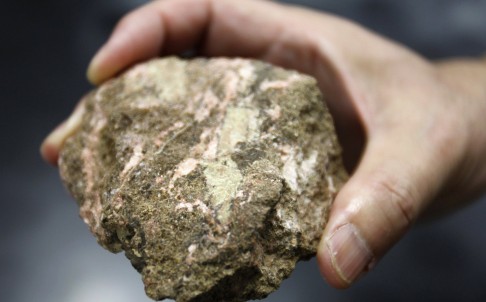
A rare-earth mineral is shown in Tokyo. China meets more than 90 per cent of the global demand for them. Photo: Reuters
China has launched a five-month crackdown against the illegal mining and exporting of its rare earths, chinanews.com reported on Monday.
Staring on October 10 and lasting until March 31, the Ministry of Land and Resources, Ministry of Industry and Information Technology, Ministry of Public Security and Ministry of Environmental Protection along with eight other ministries will work together to investigate and punish illegal miners and smugglers of the highly coveted elements.
The effort will be supervised by the provincial and city governments.
The illegal mining, processing and trading of the mineral products has led to a “black interest chain”, the report said.
Despite previous campaigns to streamline the rare earth industry by giving control to state-owned mining companies and setting production quotas on a small number of authorised firms, illegal mining, pollution and smuggling of the 17 elements in the rare earth category in China remain ubiquitous, leading to a plunge in prices.
Rare earths are used in a variety of industrial, military and hi-tech products, from wind turbines to hybrid car batteries to iPhones. China maintains that it has 23 per cent of the world’s rare earth reserves, but foreign estimates say it has up to 40 per cent. China’s rare earth industry meets more than 90 per cent of the global demand.
The United States, Europe and Japan have all submitted complaints to the World Trade Organisation declaring that China’s production and export quotas are restricting supply to the global market, therefore giving Chinese companies an unusual competitive advantage, though China maintains its actions are due to environmental reasons.
Professor loses qualifications after sex with his students
By Cao Siqi Source: Global Times Published: 2014-10-16 0:38:03
A history professor at Xiamen University in Fujian Province was expelled from the Communist Party of China and had his teaching qualifications revoked for abusing his position and having sex with female students, the university announced Tuesday night.
Wu Chunming's behavior was exposed by an anonymous Weibo user in June, who claimed that Wu had approached many female students offering to provide thesis supervision and to recommend them for postgraduate or doctoral studies.
During a three-month investigation, Wu admitted to the inappropriate behavior and said that he could not remember how many female students he had had sex with, reported the Fujian-based Strait Herald.
A photo uploaded to Weibo by a different user in July showed Wu in bed, partially naked. The person who posted the picture said she was coerced into having a long-term sexual relationship with Wu.
Some students from the history department said they were shocked by the news and that "Wu looked like a decent person, judging from his appearance."
"This punishment is too weak. Wu could return to teaching after five years," Li Ying, a lawyer representing one of the female students, told the Global Times, referring to the fact that under China's regulations regarding teacher misconduct, Wu can re-apply for his qualifications after a suspension period.
Li expressed fears that Wu might retain the title of professor and be allowed to work for the university in other roles.
82 million still under poverty line in China
By Agatha Yuen Source: Global Times Published: 2014-10-15 0:33:09
GDP ‘ineffective’ as measure of prosperity in poor regions
At least 82 million people in China are still suffering from poverty, despite the country being the second-largest economy in the world, the country's poverty alleviation task force announced Tuesday.
Zheng Wenkai, vice-minister of the State Council Leading Group Office of Poverty Alleviation and Development, told a press conference in Beijing that poverty is still a salient problem in China.
"Up to the end of 2013, demographically, 82.49 million people are still trapped in poverty according to China's poverty line, and 200 million according to the international one," he said.
According to a standard adopted in 2011, rural residents with an annual net income of about $375 or less are classified as poor in China. The country's poverty line is equivalent to less than $1 a day, while extreme poverty, according to the World Bank, is measured according to the international poverty line of $1.25 a day (in 2005 prices).
Data from the office also shows that 120,000 villages, 832 key counties and counties in extremely poor contiguous regions remain poverty-stricken.
Poor people are not only poorly paid, but also beset by unavailability of water, roads, electricity, schooling, healthcare and cannot access higher incomes or loans.
Zheng admitted that there are difficulties in solving the problems as poor populations are concentrated in extremely poor contiguous regions with poor living conditions, inadequate infrastructure as well as being afflicted with natural disasters.
"It's a tough nut to crack. Poverty is a weak point for our goal of building a moderately prosperous society in all respects by 2020," he added.
The International Monetary Fund (IMF) estimated earlier that China will surpass the US in terms of GDP, becoming the largest economy in the world as China in 2014 has reached $17.6 trillion or 16.48 percent of the world's purchasing-power-adjusted GDP, which is 0.2 percentage points more than the US.
Li Shi, director of the China Institute for Income Distribution at Beijing Normal University, said that he is not surprised by the number of those classified as being in poverty as China has a huge population compared to other countries, so it is understandable that it has a relatively high population below the poverty line.
Wang Xiaolu, a deputy director of the National Economic Research Institute at the China Reform Foundation, said GDP does not truly reflect the poverty situation of a country but it is the GDP per capita that matters.
China's GDP may seem to be overtaking the US, but China's per capita GDP in 2013 was only $6,767, according to the National Bureau of Statistics, while that in the US in the same year was $53,143, according to the World Bank.
The poverty alleviation authority Tuesday also vowed to reform a program assisting counties designated as national poverty-stricken counties after widespread public complaints over some of these counties' misuse of poverty alleviation funds and their reluctance to exit the program.
Su Guoxia, an official with the poverty alleviation office, told reporters that the authorities will take three steps to tackle the problem. This will include cancelation or reduction of the proportion of GDP in the assessment of poverty-stricken counties, establishing a restraint mechanism to prohibit counties from unnecessary infrastructure projects and establishing an exit mechanism for poor counties with incentives.
Du Xiaoshan, a deputy director at the Rural Development Institute at the Chinese Academy of Social Sciences, told the Global Times that the strategies suggested would be an effective way to tackle poverty as different development zones have different problems and needs.
"In counties that have a rather poor ecological or environmental problem, the GDP should not be assessed. The assessment should focus on the recovery of its ecology and environment, such as air and water quality. These places should be assessed more on the stability of people's livelihoods, such as employment levels. These strategies will allow officials to concentrate more on improving people's living standards rather than blindly constructing roads and shopping malls," he said.
China is set to observe its first Poverty Alleviation Day on October 17, which coincides with the UN's International Day for the Eradication of Poverty. The day aims to call on the public to show concern for the poor and pro-poor programs and to encourage wider participation.
Eight die in brawl over Yunnan land dispute
Source: Global Times Published: 2014-10-17 0:38:02
Eight people have died in a clash between villagers and armed construction workers in Jinning county, Southwest China's Yunnan Province, over a land dispute, according to a preliminary investigation report published by the local government on Thursday.
The violence broke out on Tuesday between villagers and the employees of the construction company which has been building a logistics center in Fuyou village in Jinning county.
The villagers are unsatisfied with compensation paid to them after their land was expropriated to build the center, thepaper.cn reported.
On the morning before the incident, eight construction workers who were having their breakfast were tied up, beaten and drenched with gasoline by villagers, before being illegally detained by the locals, according to the investigation report.
The investigation report also said that construction workers at the building site armed themselves with "weapons" to defend themselves against the villagers.
That afternoon, "more than 1,000 people" wearing blue work uniforms and armed with iron bars came into Fuyou village, A Shurong, a local, was quoted by the Beijing Times as saying.
Other villagers claimed they were attacked by people in "black uniforms," some of whom were carrying shields bearing police markings, Caixin reported on Wednesday.
The villagers then set some of the detained workers alight, causing severe burns to four, according to the investigation.
In total, six construction workers and two villagers were killed, the local government reported on Wednesday.
Three years ago, land in the village was expropriated for the construction of the logistics center and since then the village has seen several violent confrontations between the villagers and the construction company, the Beijing Times reported on Thursday.
Smogscraper
Source: AFP Published: 2014-10-17 0:48:01
A general view shows the Shanghai World Financial Center and the skyline of the Lujiazui Financial District in Pudong, seen from the 109th floor of the Shanghai Tower (still under construction) covered in smog in Shanghai on Thursday.
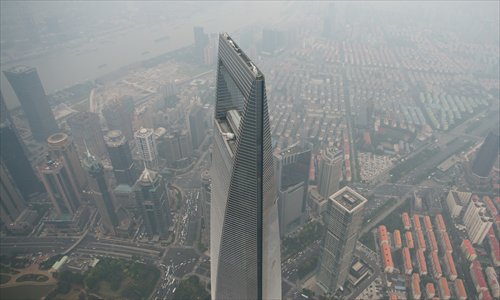
The city was shrouded with smog on Thursday morning but it had cleared by the evening. Photo: AFP
Former railways ministry official given suspended death sentence
Zhang Shuguang was accused of accepting bribes of more than 47 million yuan
PUBLISHED : Friday, 17 October, 2014, 11:04am
UPDATED : Friday, 17 October, 2014, 12:57pm
Nectar Gan [email protected]
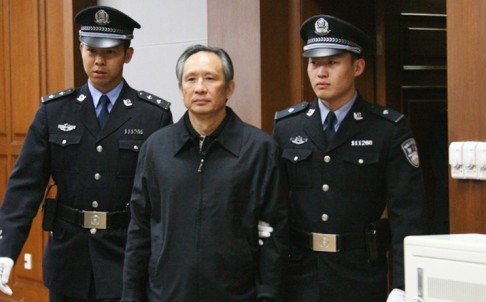
Zhang Shuguang, the former director of the railways ministry’s transport bureau and its deputy chief engineer, appears in court. Photo: Weibo
The former deputy chief engineer of the disbanded railways ministry has been given a suspended death sentence for corruption, Xinhua reported this morning.
Zhang Shuguang, who was once the director of the ministry’s transport bureau and its deputy chief engineer, was accused of accepting bribes of more than 47 million yuan (HK$59.5 million) between 2000 and 2011, while he was in charge of procuring rolling stock and other equipment for China’s railway expansion projects, the report said.
The Beijing’s No 2 Intermediate People’s Court handed Zhang a the suspended death sentence, which is usually implemented as a life sentence, this morning. He will also be deprived of all political rights for life and his personal property will be confiscated.
The 58-year-old was accused of taking bribes in exchange for using his position to help several companies win contracts for a series of high-speed rail projects.
Zhang was known for helping to promote foreign high-speed rail technology on the mainland, and he played an integral role in the rail system’s development. He was also a close associate of Liu Zhijun , the former railways minister who was given a suspended death sentence for fostering corruption throughout the railway system during his tenure and accepting 64.6 million yuan in bribes.
Liu had “the main leadership responsibility” for the deadly high-speed train crash in Zhejiang’s Wenzhou that killed 40 people in July 2011, earlier reports said.
Zhang was sacked from his position in February 2011, soon after Liu’s detention. The railways ministry was later disbanded in March last year amid widespread reports of graft.
Zhang’s case went to court last September. He pleaded guilty to all 13 charges related to bribery.
The charges include accepting bribes worth 10.5 million yuan since 2000 from Yang Jianyu, the former president of Guangzhou Zhongche Railway Vehicles Equipment, which provided “the Blue Arrow” high-speed trains that ran between Guangzhou and Shenzhen until 2012.
Yang testified that he hired Zhang’s mistress on a monthly salary of 16,000 yuan since 2009 just to please Zhang, Xinhua reported. .
During the trial, prosecutors said Zhang had been offered most of the bribes since 2004, when China launched its ambitious high-speed-railway plan after the State Council released its mid-to-long term railway development plan.
According to prosecutors, 10 private and two state-owned companies – China Railway Construction Electrification Bureau Group and China CREC Railway Electrification Bureau Group – offered bribes to Zhang.
The largest bribes came from the owner of a Wuhan rail-related company which, on three occasions between 2007 and 2009, paid Zhang a total of 18.5 million yuan.
Zhang was also accused of extorting 8 million yuan from a railway company owner in Jiangsu and accepting bribes from two rail-related company owners of 10 million and 5 million respectively, because “he needed money” for his attempts to get himself a fellowship in the Chinese Academy of Sciences in 2007 and 2008, which were unsuccessful, Xinhua said.
Zhang was one of the most notorious of the so-called naked officials – those who remain in China but relocate their families abroad often to use their ill-gotten proceeds. Mainland media have widely reported that his wife and daughter moved to the US a few years ago and now own a luxury villa in California and have speculated he may have as much as US$2.8 billion stashed away in overseas accounts.
Chinese journalist jailed for defamation after writing exposés on state firm Zoomlion
Investigative reporter Chen Yongzhou sentenced to one year and 10 months in prison, and fined 20,000 yuan
PUBLISHED : Friday, 17 October, 2014, 2:00pm
UPDATED : Friday, 17 October, 2014, 3:13pm
Reuters in Beijing
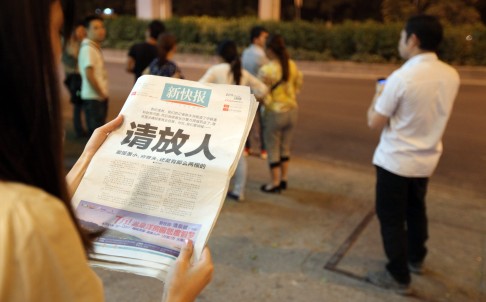
A woman reads the front page of the New Express tabloid, which features a plea to release Chen Yongzhou. Photo: EPA
A Chinese investigative journalist who wrote reports critical of a state-controlled construction equipment maker has been sentenced to prison after being found guilty of defamation and bribery, according to state media on Friday.
A court in Changsha, capital of central Hunan province, has found Chen Yongzhou guilty of "fabricating and spreading falsehoods to damage the business reputation of others", state news agency Xinhua reported.
Last year, Chen published stories in New Express, a state-backed tabloid based in the southern city of Guangzhou, alleging that Zoomlion Heavy Industry Science and Technology had engaged in sales fraud, exaggerated its profits and used public relations to defame its competitors.
The Changsha-based company has denied the allegations.
Chen was then detained by police on suspicion of tarnishing the reputation of Zoomlion. He later appeared on state television confessing that he had accepted bribes for fabricating stories on the company.
A Zoomlion employee has publicly accused the company’s hometown competitor, Sany Group, of planting those stories. Sany has denied any wrongdoing.
Chen’s arrest, which coincides with a government clampdown on journalists, lawyers and internet users in China, has drawn public attention to the role and plight of whistle-blowers as the country’s leadership moves to eradicate graft.
Last year, New Express published two front-page pleas for police to release him, an unusually bold move that drew widespread attention and sympathy from the public.
The court in Changsha said Chen was guilty of accepting bribes of 30,000 yuan (HK$37,900) but did not say who he accepted the bribes from. He was sentenced to one year and 10 months in prison and fined 20,000 yuan.
Zhuo Zhiqiang, who co-authored some Zoomlion stories with Chen, was sentenced to 10 months in jail and fined 10,000 yuan.
Chinese journalists say they are often intimidated, harassed or detained if they tread on politically sensitive stories.
In August, Liu Hu, a Chinese journalist who also worked for New Express and had accused officials of corruption, was released after almost a year in detention.
China’s foreign ministry said on Monday that a Chinese woman who helped with the German weekly Die Zeit’s coverage of the protests in Hong Kong was working for the newspaper without permission and had been arrested on suspicion of "causing a disturbance".
Man imprisoned, fined for 1.2m yuan property scam
Shanghai Daily, October 18, 2014
A man who swindled more than 1.2 million yuan (US$196,000) from a prospective home buyer has been sentenced to 10-and-a-half years in prison and fined 30,000 yuan, the Jing’an District People’s Court said yesterday.
The 30-year-old, surnamed Li, met his victim, surnamed Yang, last year at a real estate company, where they exchanged contact details.
Sometime later, Yang contacted Li, whom he believed to be a property broker, and asked for his help in buying an apartment in Hongkou District that was up for auction, the court heard.
Yang paid Li 20,000 yuan in cash and transferred 130,000 yuan to his bank account to cover the auction deposit.
Prosecutors said that Li even hired an accomplice to pose as an employee of the auction agency to receive Yang’s payment.
Earlier this year, Li told Yang that he had succeeded in securing the 80-square-meter property and presented his unwitting “client” with counterfeit sales documents. In return, Yang settled the outstanding balance on the deal of almost 1.1 million yuan.
However, when Yang tried to register his new home at the housing transaction center in Hongkou, officials told him the documents were fake.
When he contacted the company at whose office he had met Li, he was told the swindler was not a full-time employee but was commissioned only to identify potential clients.
Yang took his story to the police and Li was detained.
The court said that Li was addicted to online gambling and had squandered the money he’d swindled from Yang.
Reporter who wrote fake news to face 22 months in Jail
CRI, October 17, 2014
Chen Yongzhou, New Express Daily reporter, was slapped with a jail-term of one year and 10 months and a fine of 20,000 yuan after writing a series of fabricated news articles.
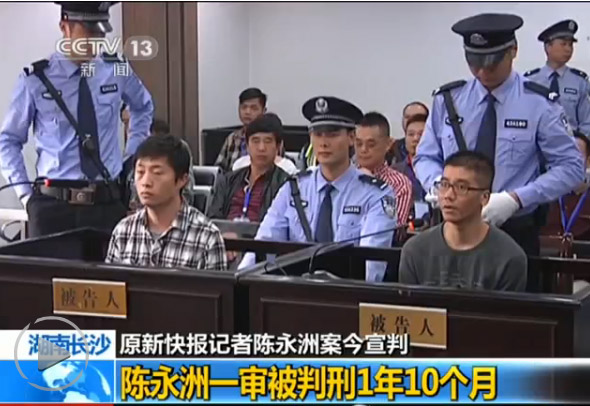
The screen shot from CCTV shows Chen Yongzhou (front, left) in the People’s Court of Yuelu district, Changsha, Hunan province on October 17, 2014. [Photo: CCTV]
Chen was arrested in 2013, by four policemen in Changsha,a city in South-China's Hunan province, for writing a series of articles about Hunan province-based engineering company Zoomlion's financial troubles. The article's alleged that the company possibly stealing state assets and making fake financial reports.
The Changsha city police said they have enough evidence to prove that Chen fabricated facts to hurt the Changsha-based engineering company in a series of 18 articles published over the past year, thus damaging Zoomlion's reputation.
2 Chinese journalists jailed for fabricated stories
E-mail Xinhua, October 17, 2014
Two Chinese journalists received jail time on Friday over fabricating news reports targeting a major listed engineering company, said a local court in central China's Hunan Province.
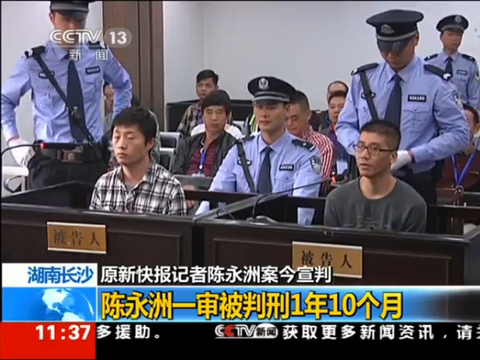
Chen Yongzhou (L), of daily newspaper the New Express was sentenced to one year and ten months in prison for inflicting damage to the commercial reputation of Zoomlion with a series of false reports between September 2012 and May 2013. [Video clip]
Chen Yongzhou, of daily newspaper the New Express, based in Guangzhou of neighboring Guangdong Province, was sentenced to one year and ten months in prison for inflicting damage to the commercial reputation of Zoomlion with a series of false reports between September 2012 and May 2013, said a verdict by the Yuelu district people's court in Changsha, capital of Hunan.
The reports had resulted in the company's stocks dropping and public accusations against its management.
The 28-year-old was also convicted of taking 30,000 yuan (4,900 U.S. dollars) in bribes in May 2013, it said.
The court ordered confiscation of his illegal gains and added an additional 20,000 yuan fine.
Meanwhile, Zhuo Zhiqiang, co-writer of one of the untrue stories, was handed down a 10-month jail term and ordered to pay a fine of 10,000 yuan.
Villagers burn 4 people to death in row over land
Shanghai Daily, October 17, 2014
Villagers in a bitter standoff with a property developer in southwestern China detained several construction workers and burned four of them to death in a clash that left eight people dead, authorities said yesterday.
The incident in Yunnan Province was one of the most violent land conflicts in recent years, casting a spotlight on the plight and anger of rural residents who see their livelihoods threatened when their lands are seized by developers.
Often, villagers have resorted to violence in defending their rights, making land disputes a chief cause of unrest in China.
The latest dispute in the village of Fuyou in Jinning County was over land compensation. Villagers complained about low payments for land seized for a warehouse and logistics center, a major project reportedly backed by the local government.
In a written statement, the Kunming government made no reference to its role, but said the standoff between villagers and the developer had delayed the project since May.
Villagers detained eight construction workers on Tuesday when the developer attempted to restart work on the site, the statement said. Locals then bound the workers’ hands and feet, beat them up and poured gasoline on them before throwing them onto a road near the construction site.
Villagers wielding improvised weapons later stormed the site and clashed violently with hired hands, the statement said, although other media reports said the hired hands started the fray that killed two villagers.
The government said that during the scuffle villagers tossed homemade bombs and set fire to the gasoline-drenched detainees. Four workers burned to death and two others died from unspecified injuries, it said.
The violence hasn’t been unconditionally condemned, with at least one newspaper questioning what led to the conflict.
“It shows the local government has not made effective efforts to resolve the conflict,” said a Beijing Times editorial, adding that villagers had lost fertile lands that once provided them with handsome profits.
Similar threads
- Replies
- 11
- Views
- 1K
- Replies
- 15
- Views
- 3K
- Replies
- 10
- Views
- 982
- Replies
- 4
- Views
- 357

